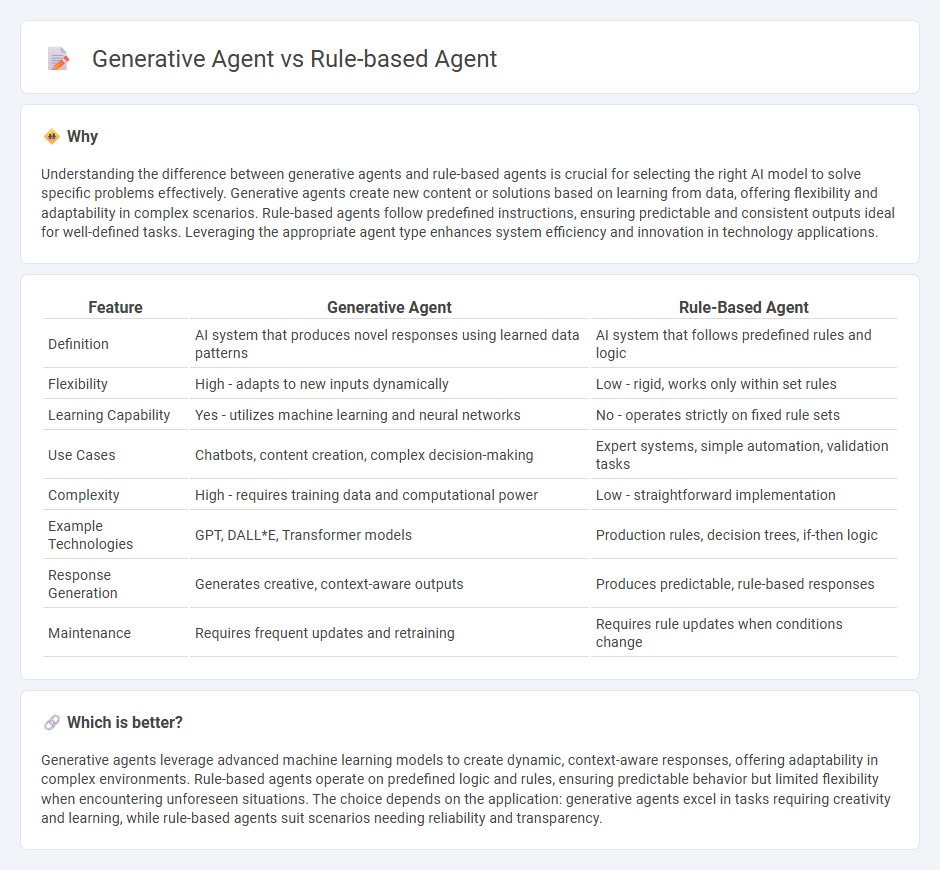
Generative agents utilize advanced machine learning models to create adaptive responses based on vast data inputs, enabling more human-like interactions and dynamic problem-solving. Rule-based agents operate on predefined sets of rules, executing specific actions when triggered by certain conditions, often resulting in predictable but limited behavior. Explore further to understand how these agents transform automation and decision-making in technology.
Why it is important
Understanding the difference between generative agents and rule-based agents is crucial for selecting the right AI model to solve specific problems effectively. Generative agents create new content or solutions based on learning from data, offering flexibility and adaptability in complex scenarios. Rule-based agents follow predefined instructions, ensuring predictable and consistent outputs ideal for well-defined tasks. Leveraging the appropriate agent type enhances system efficiency and innovation in technology applications.
Comparison Table
| Feature | Generative Agent | Rule-Based Agent |
|---|---|---|
| Definition | AI system that produces novel responses using learned data patterns | AI system that follows predefined rules and logic |
| Flexibility | High - adapts to new inputs dynamically | Low - rigid, works only within set rules |
| Learning Capability | Yes - utilizes machine learning and neural networks | No - operates strictly on fixed rule sets |
| Use Cases | Chatbots, content creation, complex decision-making | Expert systems, simple automation, validation tasks |
| Complexity | High - requires training data and computational power | Low - straightforward implementation |
| Example Technologies | GPT, DALL*E, Transformer models | Production rules, decision trees, if-then logic |
| Response Generation | Generates creative, context-aware outputs | Produces predictable, rule-based responses |
| Maintenance | Requires frequent updates and retraining | Requires rule updates when conditions change |
Which is better?
Generative agents leverage advanced machine learning models to create dynamic, context-aware responses, offering adaptability in complex environments. Rule-based agents operate on predefined logic and rules, ensuring predictable behavior but limited flexibility when encountering unforeseen situations. The choice depends on the application: generative agents excel in tasks requiring creativity and learning, while rule-based agents suit scenarios needing reliability and transparency.
Connection
Generative agents and rule-based agents are connected through their complementary approaches to artificial intelligence, where generative agents create autonomous, context-aware responses using learned data patterns, while rule-based agents rely on predefined logical rules for decision-making. Both systems enhance AI capabilities by combining the flexibility of generative models with the precision and predictability of rule-based frameworks. Their integration supports complex problem-solving in domains like natural language processing, robotics, and automated reasoning systems.
Key Terms
Decision Rules
Rule-based agents operate on predefined decision rules crafted by experts, enabling deterministic responses to specific inputs. Generative agents utilize machine learning models to generate decisions based on learned patterns from vast data, allowing adaptive and context-aware behavior. Explore more to understand how decision rules impact agent performance and flexibility.
Machine Learning
Rule-based agents operate using predefined rules and logic, making decisions based on explicit instructions without learning from data. Generative agents leverage machine learning models, such as neural networks, to create novel outputs by recognizing patterns and adapting from training data. Explore detailed comparisons to understand their applications and trade-offs in machine learning contexts.
Adaptability
Rule-based agents follow predefined sets of rules and struggle with unfamiliar scenarios, limiting their adaptability in dynamic environments. Generative agents leverage machine learning models to generate responses based on context, exhibiting higher flexibility and the ability to handle novel situations. Explore how these adaptability traits impact real-world applications and system performance.
Source and External Links
Rule-Based System in AI - A foundational AI approach that relies on explicit rules and logical reasoning to solve problems by applying these rules to a knowledge base.
Rule-Based System - A computer system using domain-specific rules and general-purpose reasoning to solve domain problems, often using "if-then" logic.
What are AI Agents? - AI agents, including rule-based agents, are software programs that interact with their environment to achieve predetermined goals through autonomous decision-making.
 dowidth.com
dowidth.com